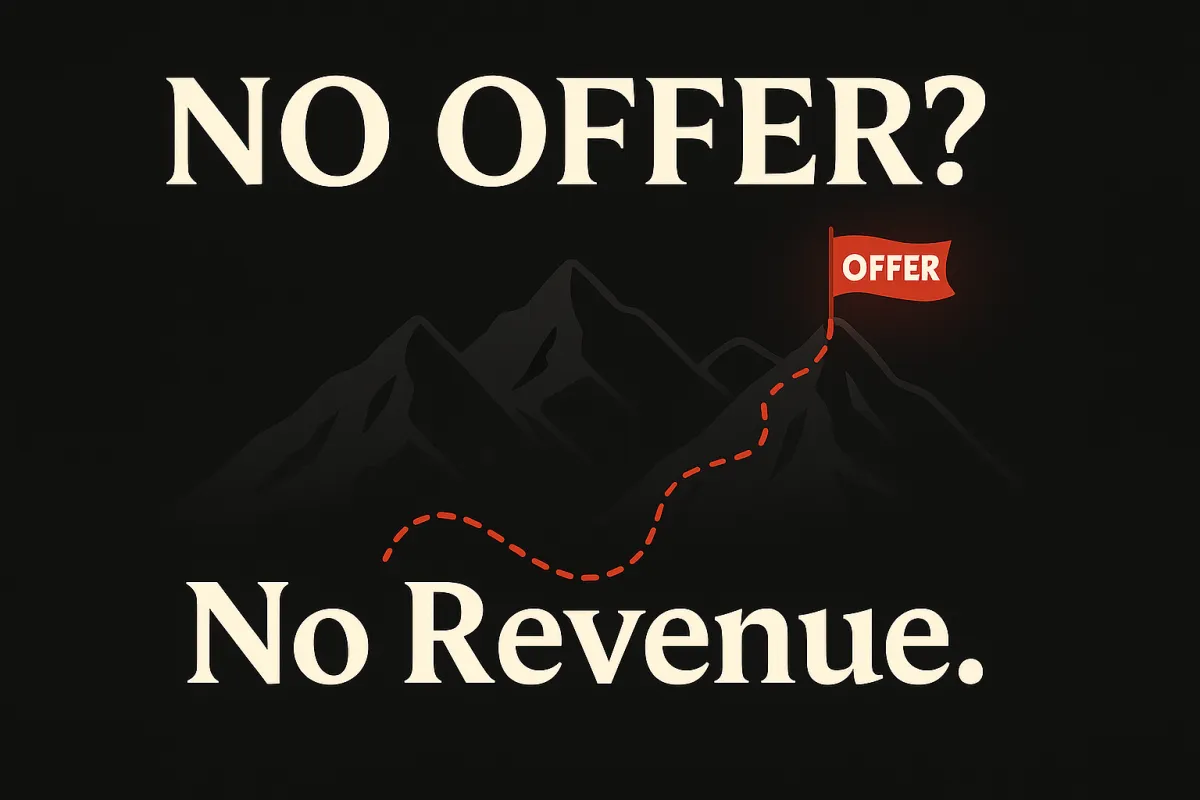
The Missing Link Between Inspiration and Income: The Irresistible Offer
Imagine your brand as a vast mountain range.
Transformation is at the top.
Inspiration is the view from the summit.
Content is the guidebook.
But the offer?
It’s an invitation wrapped in a promise—
“I’ve set the ropes. I know the path. I can guide you.”
Without it, people admire from a distance.
But they don’t act.
They feel seen, but stay stuck.
And you stay visible—but unpaid.
If there's no clear, compelling next step, interest fades into indecision.
A brand without an offer is just broadcasting.
A brand with an irresistible offer creates decisions, momentum, and revenue.
What an Irresistible Offer Really Is
“The irresistible offer is where the believable ROI is communicated so clearly and efficiently that it’s immediately apparent you’d have to be a fool to pass it up.”
— Robert W. Bly
It’s not about adding hours, stacking bonuses, or overbuilding.
It’s about removing friction—closing the gap between “this is great” and “let’s go.”
An irresistible offer is the shortest, clearest path from where they are to where they want to be—presented in a way that feels doable, valuable, and safe to say yes to.
It doesn’t sell time or access.
It offers a transformation they care about deeply.
The value isn’t in what’s included—
It’s in what it unlocks.
Think Emotional ROI
What’s the real cost of staying stuck—measured in time, energy, and money wasted trying to figure it out alone?
What new opportunities—connections, confidence, income—open up once this problem is solved?
How would life feel different if this problem was no longer a source of daily stress?
What does real momentum look and feel like to them—when progress finally clicks into place?
A great offer doesn’t feel like a cost.
It feels like relief—where the only thing left is gratitude.
“Finally! Thank you for creating this.”
Done right, it cuts through noise, lowers decision fatigue, and becomes scalable.
More income. More impact.
How to Design It
1. Define Who It’s For
Speak to a specific person—not a broad demographic.
2. Describe the Problem
What are they trying to fix, shift, or avoid? Use their language, not industry jargon.
3. Show the Outcome
Paint a vivid before-and-after. Don’t just promise results—show what relief looks like.
People don’t buy your process.
They buy what life looks like on the other side.
4. Outline the Path
Make the journey tangible and clear—without overwhelming.
Timeline
What’s included
Format
Bonus support
Clarity reduces hesitation.
Simplicity closes the gap.
5. Anchor the Value
Ask: “Would they feel like they’re winning even halfway through?”
If yes, you’re on the right path.
Finally, Increase the Perceived Value to 10x
Your offer should feel worth 10x what you charge—especially early on, when you don’t yet have leverage, social proof, or brand equity.
The key is to decouple value from your hours.
Do the work once. Let it deliver again and again.
That doesn’t mean eliminating live coaching—
Just don’t make it the backbone. Let it be 10–20%, not 100%.
Build Scalable Value Assets:
Pre-recorded trainings or courses
Downloadable guides or workbooks
Audio meditations or podcasts
Swipe files or customizable templates
Private group access
Curated resource vaults
Early access to future offers or content
These assets cost little to reproduce but deliver massive value.
That’s when your offer becomes not just profitable—
but sustainable, magnetic, and free from burnout.
When Pricing, Remember:
Price = Problem Solved — Not Time Spent
Your price doesn’t reflect your effort.
It reflects how urgently they want the pain to end.
If the problem is deeply felt,
they’re not counting hours.
They’re asking:
“Have they done it themselves?”
“Have they helped others like me?”
“Will this actually work for me?”
Make sure the answer to each one is a clear yes—
and you won’t need to push.
Your Offer Doesn’t Need to Be Perfect to Launch
But it does need to launch to become perfect.
Launch → Watch → Adjust.
The first version is just the beginning.
Ask yourself:
Where do people pause or bounce?
What questions keep coming up?
Does the value feel obvious at the price point?
What parts can be streamlined?
Freely experiment until you find the right fit.
You’re not chasing perfection.
You’re building traction, clarity, and trust—one iteration at a time.
Until next time,
Keep climbing.
— Shaan
